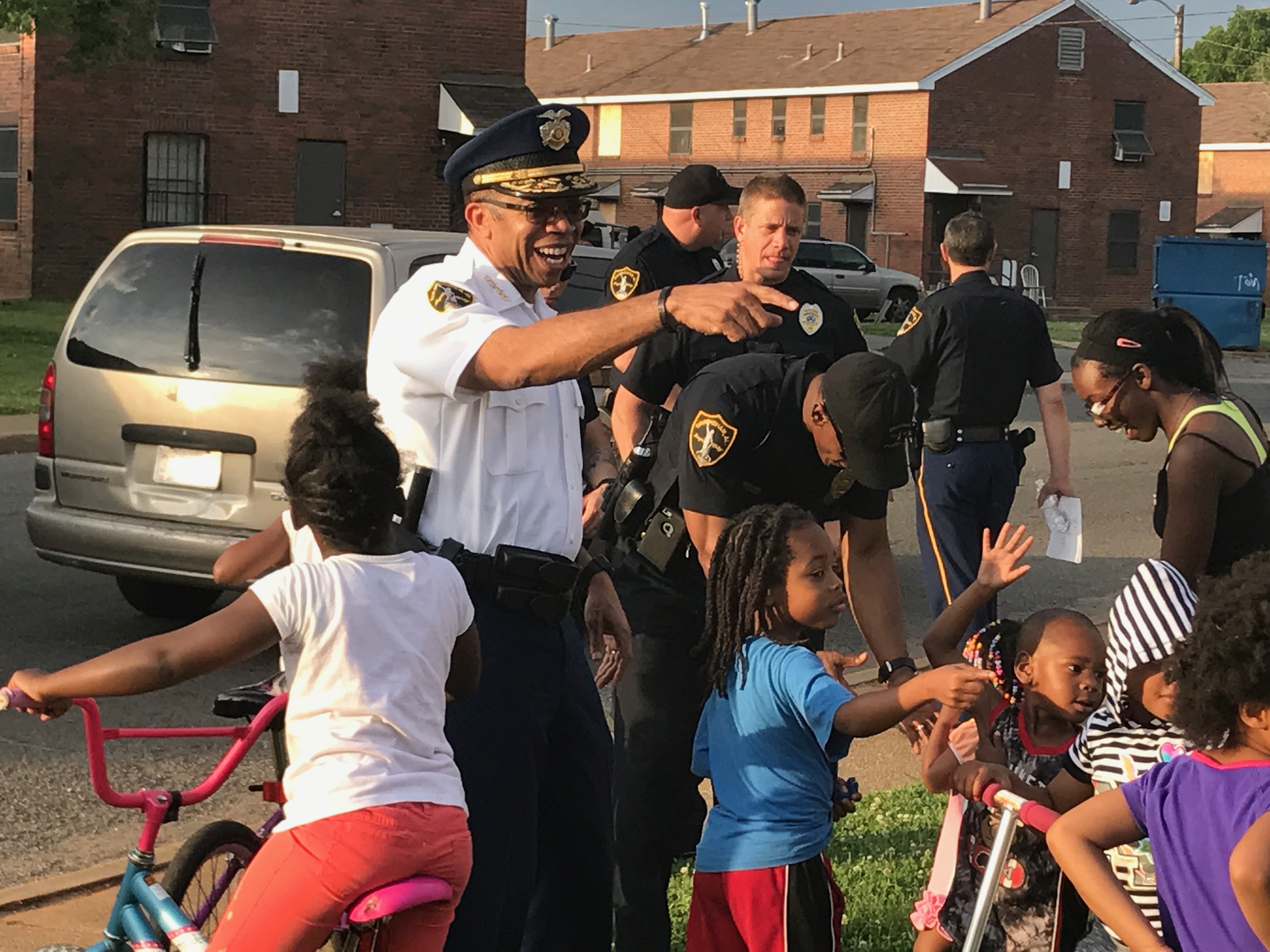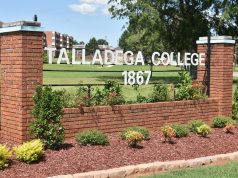By A.C. Roper
One morning over 30 years ago, a young 21-year-old-year kid woke up in the Central City Public Housing Community in downtown Birmingham, climbed out of bed and started his first day of training to become a police officer.
That kid was me and as I reflect back over my career in three different law enforcement agencies, I wonder if that same kid woke up today, could he navigate the roadblocks and challenges, and get the same opportunities to become the Chief of Police in his hometown; the city where he was raised by his grandmother on what was called the wrong side of the tracks. Why?
Because times have changed and we’ve seen the results of poor police community relations as we look across the nation at the protests, riots, mistrust, and the effects of violent crime in our most challenged neighborhoods. As Chief of Police, I have the honor of working with Mayor Bell and the amazing men and women who have taken an oath to serve and protect our citizens. Far too many have made the ultimate sacrifice honoring their oath of office. However, in spite of their commitment and selfless service, our agency cannot be successful without good community support.
The Police And The Public
Sir Robert Peel, the father of modern law enforcement is quoted as saying “The police are the public and the public are the police.” He was speaking to the critical link of police agencies and the public we serve. This means Community Policing must be more than a buzzword, because it brings together law enforcement, the community and business organizations and actually serves as a bridge connecting the three for a common purpose. We need more partnerships because the Birmingham Police Department simply cannot be everywhere and do everything.
Our department’s goal is to maintain and strengthen established relationships and develop partnerships where none previously existed. To that end, Birmingham was honored to be selected as one of six national pilot sites for the Department of Justice National Initiative for Building Community Trust and Justice.
We saw this initiative as an opportunity to strengthen relationships, increase public cooperation, and improve the perception of police legitimacy across our city. This three-year project is establishing and evaluating site specific strategies to enhance procedural justice, reduce implicit bias, and promote reconciliation. The results will be used as part of a national playbook to improve police-community relations across the nation.
However, good community relations are not enough when we are challenged by violent crime. We are all deeply concerned when we see Birmingham listed on any violent crime lists, although we realize the rankings are disingenuous since we report over one thousand misdemeanor crimes which some cities omit and this in fact, skewers the rankings against us. This is the primary reason the FBI clearly advises everyone against using crime reports for comparing cities because they understand the apple to orange comparison never gives a clear picture.
Multi-Faceted Approach
It is still an unfortunate reality that violent crime and specifically homicides, after years of decline increased in 2015 and 2016 across the nation and Birmingham was not immune. Regardless of income or status, our citizens deserve safe homes and safe neighborhoods! Although we recognize there are many socio-economic factors that affect crime like poverty, education, and employment, we are getting after this issue with a multi-faceted approach.
Our violence reduction strategy has been used in more than 50 other communities. It is proven to reduce violent crime when community members join together with law enforcement and social service providers to focus an anti-violence message on highly active street groups while reducing mass incarceration. This theory is based on data gathered by the National Network for Safe Communities where only 0.05% of the population is regularly associated with 75% of the violent crime in cities. This strategy puts a laser focus on small groups of individuals that are most likely to be involved in homicide related activities as either a perpetrator or victim. As research has proven, a person’s social network or associations has a major impact on homicide victimization rates. This strategy uses law enforcement, community members, including those who are most affected by violent crimes and Social Services providers to assist those individuals wanting to change their lives.
Positive Results
Although it takes time, the initiative is starting to see positive results. For example, in this segment of our population, homicides are down 33 percent and non- fatal shootings are down 60 percent for the first half of this year. We are still challenged with too many young men willing to pull a trigger for the slightest provocation and domestic violence homicides which drove our increase last year. We believe our partnership with the One Place Metro Alabama Family Justice Center where victims of domestic violence and sexual assault will have access to coordinated collaborative resources through a team of multi-disciplinary professionals in one location can make a difference.
In addition, the City of Birmingham was designated as one of the new Public Safety Partnership (PSP) Cities. PSP provides an innovative framework for partnerships at the local, state and federal level in the investigation, prosecution, and deterrence of violent crime, especially crime related to gun violence and gangs. Partners will work with us to identify and prioritize resources that will help us address violent crime with data-driven, evidence-based strategies tailored to the unique local needs of Birmingham. We are sensitive to the concerns of our citizens and will retain control of our local efforts but welcome the coordinated training and technical assistance for this three-year period.
‘Key on 3’
We continue to conduct local police operations like Operation Eagle which was designed to increase police visibility in an effort to improve public safety, and partner with citizens of various communities to improve the quality of life. Our metric was not arrest numbers but crime prevention. We continue to “Key on 3” which focuses on risky people, risky places and risky behaviors which lead to violent crime. This focus is driving new initiatives like our partnership with Crime Stoppers where they funded “No Loitering” signs which we are providing to any business in Birmingham. Unfortunately, we have seen tragic results when groups of young men loiter for illegal purposes, frightening employees and customers and all too often someone gets angry and shots are fired.
We are pleased with the numbers of businesses contacting us but need even more support from our citizens. For example, residential burglaries have decreased (again) but car thefts and car break-ins are up. Would you believe approximately one third of the vehicles stolen in Birmingham have the keys in them? It is very difficult for your police department to protect your vehicle when you enter an establishment and leave the vehicle running! Similarly, some criminal will forcefully enter your vehicle when you leave items of perceived value in plain view on the car seat or floorboard. Help us to help you so please hide your valuables, lock your vehicle, and make sure your neighborhood has an active Neighborhood Watch Program. Your Precinct Crime Prevention Officer will assist your neighborhood in getting started.
Building The Foundation
We have experienced some success in lowering crime but we realize there is much more work to be done as a community. We are constantly reminded that there is no substitute for personal responsibility. So as a department we are determined to do everything we can to bring the perpetrators to justice. I am so pleased with the work of our officers, detectives and support personnel and the fact that our homicide clearance rate is constantly higher than the national average. It means we can’t prevent every homicide but we will do everything we can to make the right arrest and bring some type of closure to the families.
It is because of the professional personnel of the BPD, the support of the Mayor’s office and the great citizens we serve that I am optimistic about the future. I believe we are building the foundation to make Birmingham a much safer city and provide opportunities for every young person regardless of their race or economic status in life because as I did over 30 years ago, our next generations of police officers are waking up in our city.
A.C. Roper is the Chief of the Birmingham Police Department.





